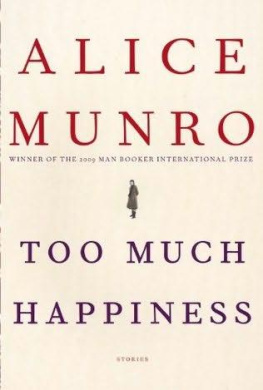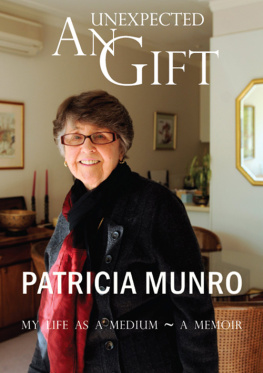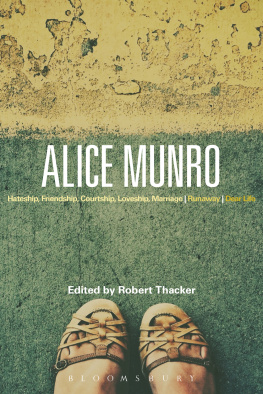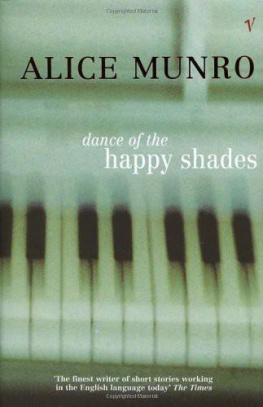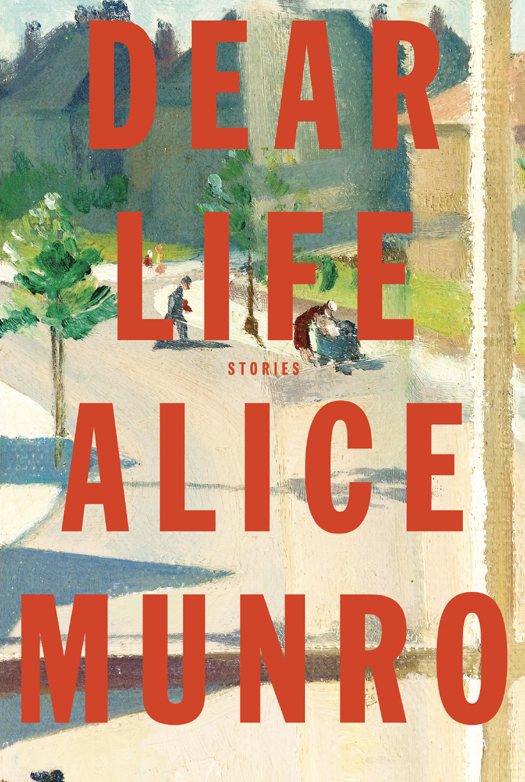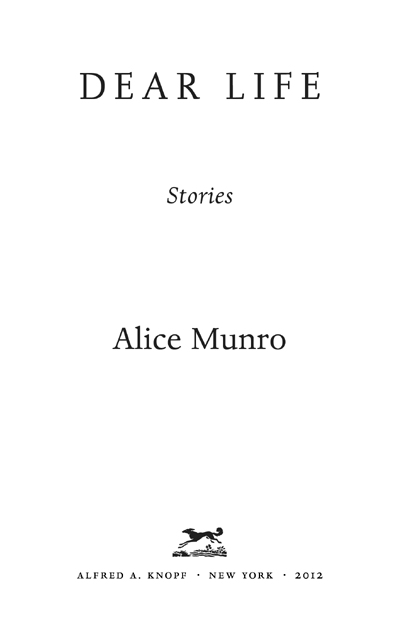THIS IS A BORZOI BOOK
PUBLISHED BY ALFRED A. KNOPF
Copyright 2012 by Alice Munro
All rights reserved. Published in the United States by Alfred A. Knopf, a division of Random House, Inc., New York. Originally published in Canada by McClelland & Stewart Ltd., a division of Random House of Canada Limited, Toronto.
www.aaknopf.com
Knopf, Borzoi Books, and the colophon are registered trademarks of Random House, Inc.
Most of the stories contained in this work were previously published in the following: In Sight of the Lake and Night in Granta; Pride and Train in Harpers Magazine; To Reach Japan in Narrative Magazine; Amundsen, Corrie, Dear Life, Gravel, Haven, and Leaving Maverly in The New Yorker; and Dolly in Tin House.
Library of Congress Cataloging-in-Publication Data
Munro, Alice.
Dear life : stories / by Alice Munro.
p. cm.
This is a Borzoi book.
eISBN: 978-0-307-96104-4
I. Title.
PR9199.3.M8D43 2012 813.54dc23 2012020455
This is a work of fiction. Any resemblance to actual persons, living or dead, events, or locales is entirely coincidental.
Jacket image: View from the artists bedroom, c. 1930 by Percy Shakespeare (detail). Paul Liss Fine Art /
The Bridgeman Art Library.
Jacket design by Carol Devine Carson
v3.1_r1
CONTENTS
TO REACH JAPAN
O NCE Peter had brought her suitcase on board the train he seemed eager to get himself out of the way. But not to leave. He explained to her that he was just uneasy that the train should start to move. Out on the platform looking up at their window, he stood waving. Smiling, waving. The smile for Katy was wide open, sunny, without a doubt in the world, as if he believed that she would continue to be a marvel to him, and he to her, forever. The smile for his wife seemed hopeful and trusting, with some sort of determination about it. Something that could not easily be put into words and indeed might never be. If Greta had mentioned such a thing he would have said, Dont be ridiculous. And she would have agreed with him, thinking that it was unnatural for people who saw each other daily, constantly, to have to go through explanations of any kind.
When Peter was a baby, his mother had carried him across some mountains whose name Greta kept forgetting, in order to get out of Soviet Czechoslovakia into Western Europe. There were other people of course. Peters father had intended to be with them but he had been sent to a sanatorium just before the date for the secret departure. He was to follow them when he could, but he died instead.
Ive read stories like that, Greta said, when Peter first told her about this. She explained how in the stories the baby would start to cry and invariably had to be smothered or strangled so that the noise did not endanger the whole illegal party.
Peter said he had never heard such a story and would not say what his mother would have done in such circumstances.
What she did do was get to British Columbia where she improved her English and got a job teaching what was then called Business Practice to high school students. She brought up Peter on her own and sent him to college, and now he was an engineer. When she came to their apartment, and later to their house, she always sat in the front room, never coming into the kitchen unless Greta invited her. That was her way. She carried not noticing to an extreme. Not noticing, not intruding, not suggesting, though in every single household skill or art she left her daughter-in-law far behind.
Also, she got rid of the apartment where Peter had been brought up and moved into a smaller one with no bedroom, just room for a foldout couch. So Peter cant go home to Mother? Greta teased her, but she seemed startled. Jokes pained her. Maybe it was a problem of language. But English was her usual language now and indeed the only language Peter knew. He had learned Business Practicethough not from his motherwhen Greta was learning Paradise Lost. She avoided anything useful like the plague. It seemed he did the opposite.
With the glass between them, and Katy never allowing the waving to slow down, they indulged in looks of comic or indeed insane goodwill. She thought how nice-looking he was, and how he seemed to be so unaware of it. He wore a brush cut, in the style of the timeparticularly if you were anything like an engineerand his light-colored skin was never flushed like hers, never blotchy from the sun, but evenly tanned whatever the season.
His opinions were something like his complexion. When they went to see a movie, he never wanted to talk about it afterwards. He would say that it was good, or pretty good, or okay. He didnt see the point in going further. He watched television, he read a book in somewhat the same way. He had patience with such things. The people who put them together were probably doing the best they could. Greta used to argue, rashly asking whether he would say the same thing about a bridge. The people who did it did their best but their best was not good enough so it fell down.
Instead of arguing, he just laughed.
It was not the same thing, he said.
No?
No.
Greta should have realized that this attitudehands off, tolerantwas a blessing for her, because she was a poet, and there were things in her poems that were in no way cheerful or easy to explain.
(Peters mother and the people he worked withthose who knew about itstill said poetess. She had trained him not to. Otherwise, no training necessary. The relatives she had left behind in her life, and the people she knew now in her role as a housewife and mother, did not have to be trained because they knew nothing about this peculiarity.)
It would become hard to explain, later on in her life, just what was okay in that time and what was not. You might say, well, feminism was not. But then you would have to explain that feminism was not even a word people used. Then you would get all tied up saying that having any serious idea, let alone ambition, or maybe even reading a real book, could be seen as suspect, having something to do with your childs getting pneumonia, and a political remark at an office party might have cost your husband his promotion. It would not have mattered which political party either. It was a womans shooting off her mouth that did it.
People would laugh and say, Oh surely you are joking and you would have to say, Well, but not that much. Then she would say, one thing, though, was that if you were writing poetry it was somewhat safer to be a woman than a man. That was where the word poetess came in handy, like a web of spun sugar. Peter would not have felt that way, she said, but remember he had been born in Europe. He would have understood, though, how the men he worked with were supposed to feel about such things.
That summer Peter was going to spend a month or maybe longer in charge of a job that was being done at Lund, far up, in fact as far as you could go north, on the mainland. There was no accommodation for Katy and Greta.
But Greta had kept in touch with a girl she used to work with in the Vancouver library, who was married now and living in Toronto. She and her husband were going to spend a month in Europe that summerhe was a teacherand she had written Greta wondering if Greta and her family would do them a favorshe was very politeby occupying the house in Toronto for part of that time, not letting it stand empty. And Greta had written back telling her about Peters job but taking up the offer for Katy and herself.





